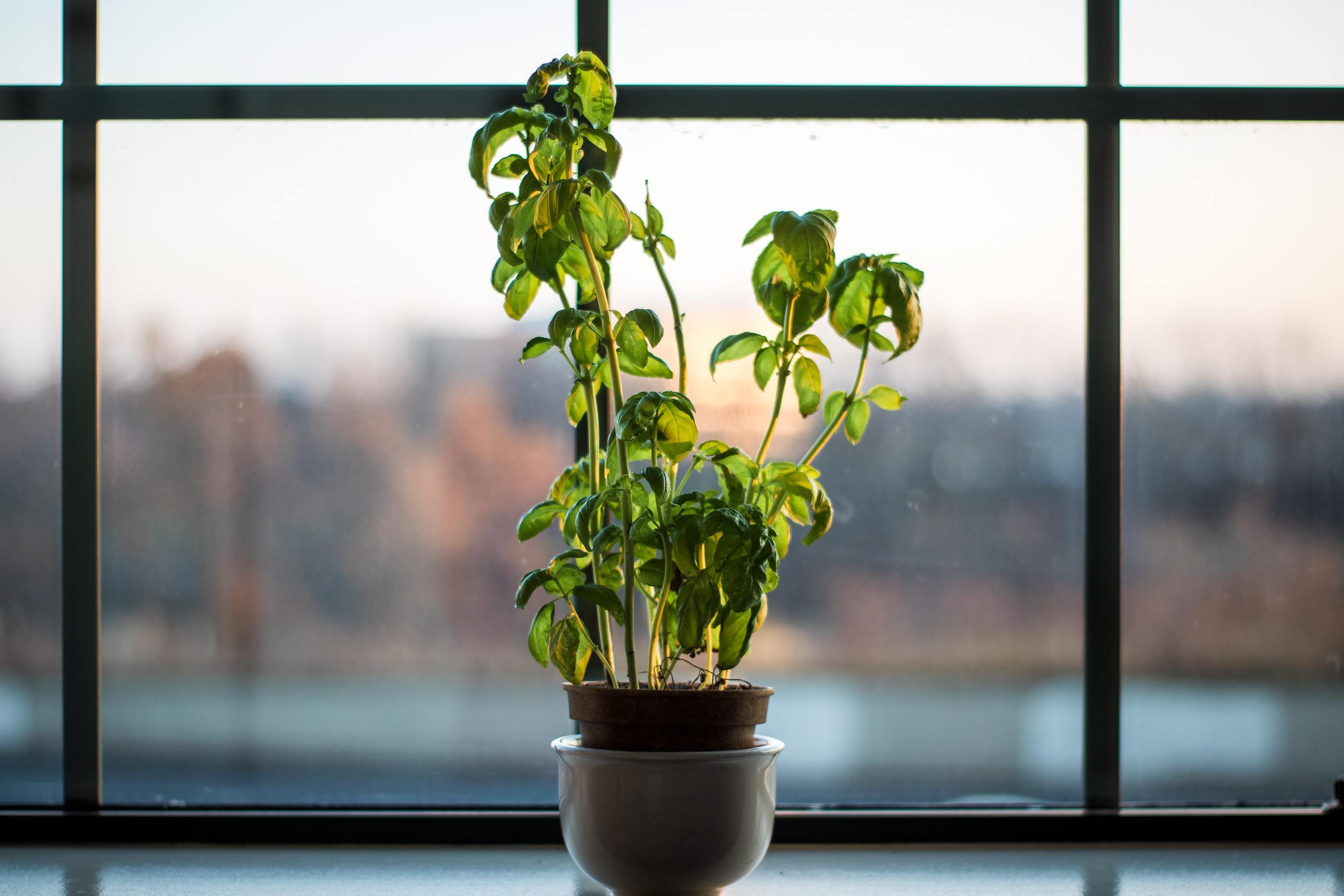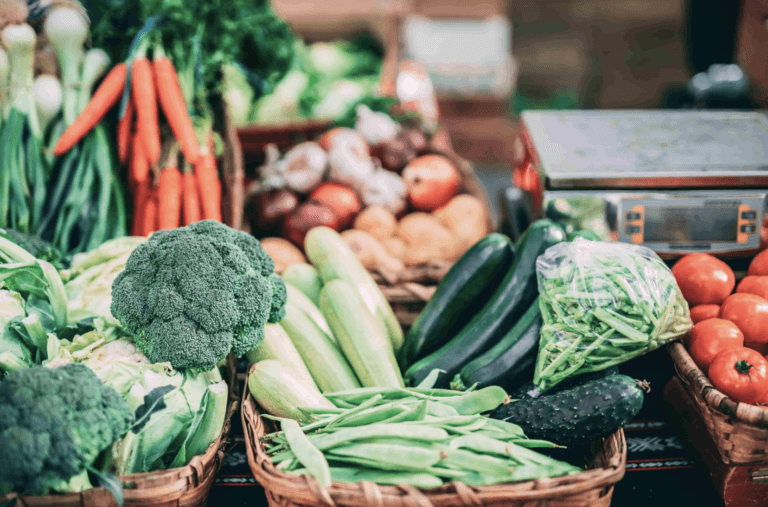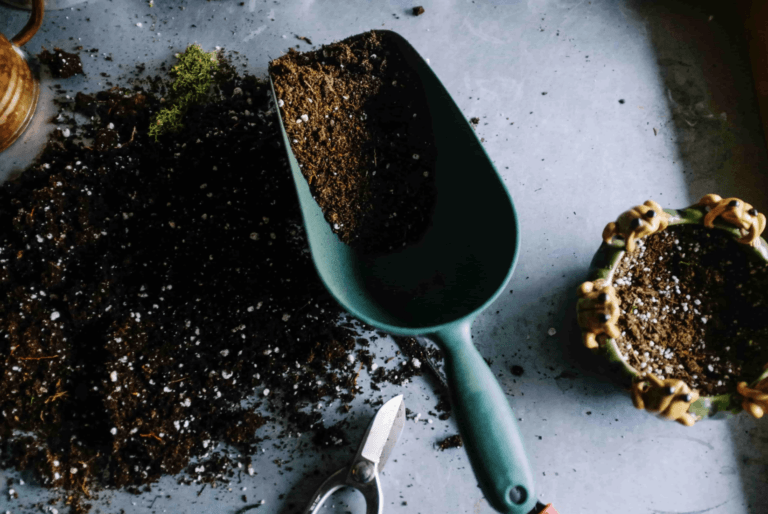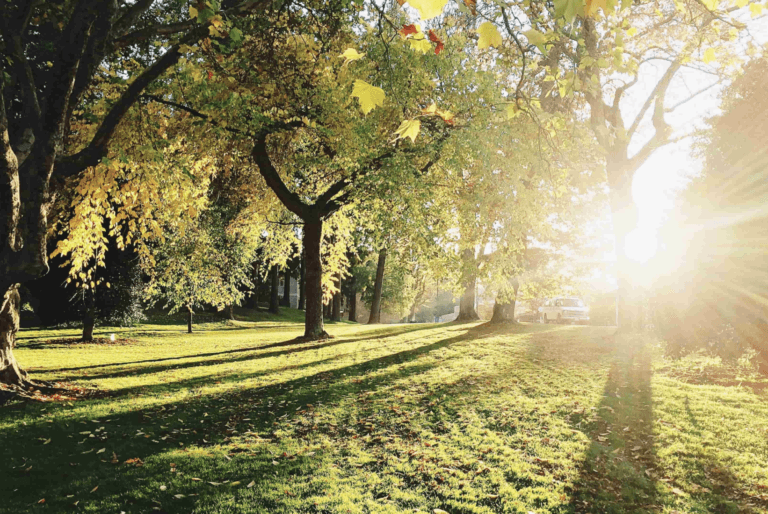
Kathryn Kellogg is a Wanderlust Presenter, the author of “101 Ways to go Zero Waste”, and the founder of Going Zero Waste. She’s a self-described climate optimist and National Geographic’s spokesperson for going plastic-free.
1. Switch Your Energy:
Up first, let’s talk about energy. On average, 40% of global CO2 emissions are emitted from electricity generation. So one quick thing you can do whether you live in an apartment or rent is to switch your energy provider which is a lot easier than it sounds!
Companies like Arcadia Power and Clean Choice Energy are energy suppliers. When you sign up, they work with your existing utility company to make sure all of the energy you use is supplied by clean energy sources. This doesn’t cost anything extra for you and in fact, you’ll probably see your electricity bill go down!
2. Eat More Plants:
 It’s no secret that eating a plant-based diet is one of the easiest ways to have a positive impact on the environment.
It’s no secret that eating a plant-based diet is one of the easiest ways to have a positive impact on the environment.
Making bread has become a favorite leisure activity in recent week so maybe you can pair that freshly made loaf with broccoli and cheez soup or my favorite curried carrot soup.
Try adding a few more plant-heavy meals in your rotation. If you’re looking for some inspo, the comment section on this post is overflowing with delicious recipes and meal ideas!
When I switched to plant-based eating, the hardest part was breaking down my preconceived notions of what a “meal” constitutes. Once I understood the building blocks of creating meals, I had total freedom to cook easy, inexpensive, and filling meals in under 30 minutes. If you’re interested in learning the 5 Best Principles to easy, quick, and zero waste meals, join my community.
3. Divest
Have you thought about what your bank does with your money? Anything from CDs to savings accounts, banks invest your money and use it to give out loans. When I first heard that my money was being used to give people loans, I thought, “Cool! My money is being used to help someone buy a home or help someone open a small business in my town.” Which isn’t wrong, but it’s just not the whole picture.
Banks also use that money to fund a lot of projects that you might not agree with like big Tobacco, the fossil fuel industry, tar sands pipelines, and the list goes on and on. Make sure that money is working for both you and the planet. You can get my full guide to Ethical Banking and Divesting you 401k from Fossil Fuels.
4. Support Ecocide Law:
I first heard about Ecocide Law when I was researching ways for people to help with the bush fires in the Amazon that were burning last fall. The goal of ecocide law is to add The Crime of Ecocide to The Rome Statute, known as Crime Against Peace, which is one of the most powerful documents in the world. Currently, the law makes four crimes punishable in International Criminal Court.
- The Crime of Genocide
- Crimes Against Humanity
- War Crimes
- The Crime of Aggression
The goal is to add The Crime of Ecocide so people who are knowingly destroying the environment, which endangers all of humanity through climate breakdown, can be taken to court. You can learn more and I would encourage you to lend your support!
5. Compost:
 The UK generated 221.0 million tonnes of total waste in 2016, with England responsible for 85% of the UK total.
The UK generated 221.0 million tonnes of total waste in 2016, with England responsible for 85% of the UK total.
In fact, 60% of our landfills are full of organic matter because many people think their food scraps will return to the Earth, but they won’t!
Landfills are designed for storage – not decomposition. There’s no oxygen in a landfill so organic matter can’t break down creating a limbo state that releases methane. On average, methane is 30x more powerful than your average greenhouse gas like CO2. And, 16% of ALL methane emissions come from landfills. An easy way to fix this is to start composting, and as a bonus, you’ll reduce your trash by at least 50% with this one swap.
As you read that you probably thought, “I’d like to compost, but I just can’t!” So, before you make any decisions, I’d love for you to do a bit more digging. Composting is WAYYYY easier than you think. I promise! It doesn’t smell, it won’t attract rodents, and there are literally 20+ different ways to do it so you’re bound to find the perfect method for you.
If you have a backyard and you’re feeling up for the challenge check out The Ultimate Guide to Backyard Composting. If you live in an apartment or you’re looking for something very, very low-maintenance check out The Fool-Proof Guide to Composting in an Apartment (even if you don’t have a balcony).
6. Save Water:
71% of the Earth’s surface is covered in water, but only 3% of that is freshwater, and of that 3% most of it is locked under the Earth’s surface, in ice, atmosphere, and soil. This leaves only .007% of the Earth’s water available to fuel and feed its 6.8 billion people. As population rates climb this small percentage of water has to serve more people.
On top of this, water is becoming more scarce due to climate change fueled droughts meaning there will be even less water to share among us. The average household uses 349 litres of water each day, but our virtual water use, in other words, how much water goes into the food we eat, the clothes we wear, and the products we use every day, is in the thousands of gallons.
Don’t believe me? Check out the Water Footprint Calculator – it’s very eye-opening. My water footprint came to 1,262 Gallons/Day which is still a lot, and I would love to try and cut it down.
4 simple ways you can shrink your water footprint today is:
- eat more plants!
- shop secondhand.
- choose reusables like cloth towels.
- choose products made from recycled materials.
For more information and 6 more tips check out my blog post 10 Tips for Saving Water.
7. Donate:
If you have the means, I urge you to donate to a cause you believe in. I think my friend Alden Wicker lays this out really well, “If you have a limited amount of time and money, it’s more effective to donate that time and money toward nonprofits addressing environmental and systemic racism issues, than to stress yourself out trying to be perfect, or blow your budget on expensive fair trade clothing.”
Donating to organizations doing good work is easy and one of the MOST effective tools we can use. I have several recurring donations set up each month, and I donate a portion of every sponsorship I do. One of my goals this year is to create a more consistent donating schedule each month to benefit the organizations I love.
When it comes to choosing an organization, it’s always good to check them on Charity Navigator. They rank charities for effectiveness and transparency. Here are a few of the charities I have recurring donations set up for and donated to last year:
• Plastic Pollution Coalition
• Plastics for Change
• Drawdown
• Earth Justice
• Rainforest Alliance
• Rainforest Action Network
• Sierra Club
• World Wildlife Foundation
• Oceana
• Environmental Defense Fund
8. Plant A Tree:
 Did you know that planting trees is one of the easiest, cheapest and potentially most effective tools we have for combatting climate change and drawing down carbon from the atmosphere? We could reverse the last 10 years of carbon emissions by simply planting 1 trillion trees. One Tree Planted is a non-profit organization, and they plant trees in North America, South America, Africa and Asia.
Did you know that planting trees is one of the easiest, cheapest and potentially most effective tools we have for combatting climate change and drawing down carbon from the atmosphere? We could reverse the last 10 years of carbon emissions by simply planting 1 trillion trees. One Tree Planted is a non-profit organization, and they plant trees in North America, South America, Africa and Asia.
Trees are vital parts of our eco-systems that help clean the air we breathe, filter the water we drink and provide habitat to over 80% of the world’s terrestrial biodiversity. They also provide jobs to over 1.6 billion people, absorb harmful carbon from the atmosphere, and a key ingredient in more than 25% of all medicines. To make this even sweeter, it only costs $1 to plant a tree.
9. Email Your Reps:
Hey, keyboard warrior. Crack your knuckles and get ready to work, because it’s time to email your representatives.
Your representative’s job is to represent you, and they can’t do that if they don’t know what’s on your mind. It can feel overwhelming to reach out and cold email someone you’ve never met, but don’t worry about it. I’m going to walk you through it step-by-step.
My first recommendation is to check out your local Sierra Club Chapter. The Sierra Club does a good job of rounding up the current bills in your current legislative process, and the best way to find it is google, “Sierra Club Legislation in (Your State)”, I looked up 10 different states and they all popped up within the first five results except for Alaska.
To give you an example, here’s California’s page. As you can see, everything is easy to read, and they tell you which bills to support or oppose so all you have to do is copy the bill number into an email or fax to your representative, and ask them to either oppose or support those bills.
I highly recommend making this a monthly practice.
10. Offset your Carbon Footprint:
Have you ever calculated your carbon footprint? The quiz at footprintcalculator.org is my favorite one. You can pop over and plug-in the details of your life/last year, and then it will calculate how high your carbon footprint is including how many Earth’s we’d need to survive if everyone lived like you.
Back when I lived in the tiny home, my carbon footprint was one earth. This was great because we have one earth, but now that we moved to a slightly bigger place Justin and are at about 1.3 earths.
It can feel a little discouraging when you feel like you’re doing a really good job, but still can’t get seem to reach that one earth goal.
In my blog post How to Offset Your Carbon Footprint and Why You Should, I go over everything you need to know about offsetting your carbon footprint and why you should. I tell you what to look for, and how to choose a reliable organization to handle that for you.
We’ve curated a collection of yoga and meditation practices on Wanderlust TV that invite you to connect to yourself, and Mother Nature for free. Access the special Earth Day collection here.
—
 Kathryn Kellogg is the founder of Going Zero Waste, a lifestyle website that breaks eco-friendly, sustainable living down into an easy step by step process with lots of positivity and love! All of her trash for two years fits in a 16 oz mason jar, but don’t let that intimidate you. Her blog is full of small, actionable tips you can implement to make the world a little greener.
Kathryn Kellogg is the founder of Going Zero Waste, a lifestyle website that breaks eco-friendly, sustainable living down into an easy step by step process with lots of positivity and love! All of her trash for two years fits in a 16 oz mason jar, but don’t let that intimidate you. Her blog is full of small, actionable tips you can implement to make the world a little greener.
She’s the spokesperson for plastic-free living for National Geographic, and author of “101 Ways to Go Zero Waste“. Find her on Instgram here.